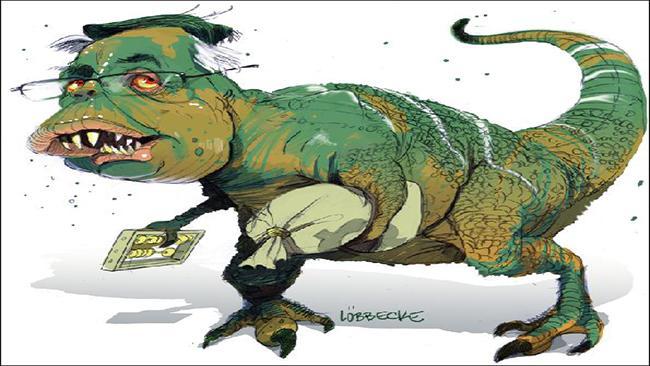
FACED with Kevin Rudd's initial foray into essay writing, Rossini's quip about Wagner's Lohengrin leapt to mind. "One cannot judge Lohengrin from a first hearing," said Rossini. "And I certainly do not intend to hear it a second time."
Unfortunately, not only was Rudd undeterred by reviews that would have silenced a lesser man, but he has spawned epigones. Foremost among them is Wayne Swan, whose latest effort was released on the weekend.
Sure, the Treasurer's colleagues, showing a shrewd sense of survival, have flocked to that most popular of authorial associations, Labor's 6W club: Where, Why, When We Went Wrong (coming soon to a Melbourne University Press distributor near you). But as he girds his loins for next month's budget, Swan remains defiant. And far from analysing Labor's blunders, he paints them as triumphs that confirm Labor's call to govern.
Deconstructing Swan's arguments is as challenging as picking a dead man's wallet. Shop-worn tropes go round and round, like unclaimed bags on an airport carousel: Labor is the party of opportunity, a sentiment to which Eddie Obeid, Ian Macdonald and John Maitland are presumably living testimony; Tony Abbott, accused of every possible malfeasance short of starting a leprosy pandemic, would destroy what this country retains of good and true; and only Swan and his colleagues stand between Tony Abbott's Visigoths and the "fair go".
All that is lacking, to complete the pictorial link with the Labor pedigree, is the virginal figure of White Australia, draped in a "land of the fair go" sash, recoiling from the Liberal hoards.
Expressed in prose as riveting as elevator music, Swan's claims are unsullied by evidence. The inconvenient fact that the Howard government made greater inroads on inequality and did far more to spread prosperity is simply ignored; instead, taking the dream-to-reality ratio to new heights, Swan focuses on the glories ahead thanks to the National Broadband Network, the Gonski spending and the National Disability Insurance Scheme.
Given the fate of his commitment to a budget surplus, one might have expected Swan to show some reticence on those promises. But fiscal rectitude came late to the Treasurer under whose watch public spending rose more than twice as rapidly as it did under Howard. And when it did come, it proved as fleeting as an alcoholic's credit in a pub.
Now, yesterday's virtues are menacing vices, and a speedy return to surplus, that only months ago was "non-negotiable", would be reckless and irresponsible. How that can be reconciled with the assertion, made just paragraphs later, that the economy is stronger than ever is left as a puzzle for less agile minds.
In the end, Swan's propositions are not merely misleading; they are incoherent. But what his writing lacks in reach it more than makes up for in anger. An eclectic hater, Swan hates people who hate each other, going from populists such as Clive Palmer to the free marketers of the Institute of Public Affairs. And most of all, he hates the "vested interests" whose hands he sees behind Labor's current unpopularity. Not that Swan claims the government has been perfect; a sliver of grace intrudes in the recognition that (unspecified) errors have been made, albeit one rapidly drowned in a sea of "say what you will" justifications.
But his account leaves little doubt that Labor's woes are due to the class enemy: as implacable as ever, and every bit as determined to grind working Australians into the dust.
Nor does Swan show any doubt that the only salvation lies in that old-time religion, the gospel of redistribution, whose tireless prophet he is. It is as if the resources boom, rather than having ended 18 months ago, would go on forever, a bottomless pot from which to finance Labor's schemes and to benefit its favoured constituencies.
Given the confusion in which Swan's views are mired, these delusions appear to spring less from a surfeit of ideology than from a deficit of clear thought. Having gained office after losing the battle of ideas, Labor was left with an operational code that belongs to another time and place: one still seething from the humiliation of the Howard years and nostalgic for a 1950s unionism that disappeared before today's cabinet ministers were in short pants.
It is thus unsurprising Swan and his colleagues have proven subservient to a union movement that combines the relentless pursuit of self-interest with a startling disregard for its policies' long-term consequences. Sheltered from market disciplines, the public-sector unions that dominate the ACTU see public spending as the key to prosperity, regardless of the costs it imposes in wasted resources, distortionary taxation and upward pressure on the exchange rate. As for their private-sector counterparts, they have shrunk to such narrow bases that the economy-wide effects of their inefficiencies escape them.
Little wonder they seem like dinosaurs: dangerous, dim-witted at all but violence and doomed to extinction. And little wonder the government they control has excelled at transforming opportunity into disaster.
In its own way, that unbroken record of failure is impressive. Its legacy, however, is an enduring fiscal weakening, with the International Monetary Fund estimating that even long after the GFC the structural budget position will have deteriorated by 1.5 per cent of GDP. And it leaves 687,000 unemployed who, put in a line with three per metre, would form a queue stretching 229km.
As for Swan, he has become the Cheshire cat of Australian treasurers: his predecessors' smirks linger, but their competence has vanished. Touchy, testy and tetchy, he scratches on; when he rises Tuesday fortnight, however, it will not be to grasp the future, but as the last gasp of the past.
Additional material at: http://blogs.theaustralian.news.com.au/henryergas/



